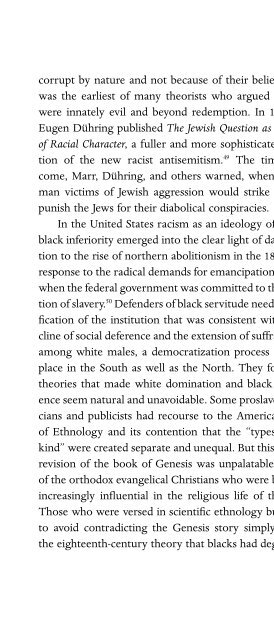Racism - A Short History - George M Fredrickson.pdf - WNLibrary
Racism - A Short History - George M Fredrickson.pdf - WNLibrary
Racism - A Short History - George M Fredrickson.pdf - WNLibrary
Create successful ePaper yourself
Turn your PDF publications into a flip-book with our unique Google optimized e-Paper software.
APPENDIX <strong>Racism</strong> in Historical Discourse<br />
encompass both the antisemitic and the color-coded varieties.<br />
The first comprehensive history of American racism,<br />
Thomas Gossett’s Race: The <strong>History</strong> of an Idea in America<br />
(1963) traced consciousness of race to the ancient world. 31<br />
Its treatment of specifically American manifestations cast<br />
its net quite wide to include representation and treatment<br />
of American Indians and immigrants from southern and<br />
eastern Europe, including Jews, as well as blacks. But most<br />
subsequent work on the history of American racism has<br />
been group-specific and has concentrated most heavily on<br />
attitudes toward African Americans. On the other hand,<br />
<strong>George</strong> Mosse’s general history of European racism, published<br />
in 1978, focused mainly on the growth of racist antisemitism<br />
and paid relatively little attention to the colorcoded<br />
racism associated with imperial expansion. 32 There<br />
appear to be only two significant attempts to cover Western<br />
attitudes toward race comprehensively: Ivan Hannaford’s<br />
Race: The <strong>History</strong> of an Idea in the West (1996) 33 and Imanuel<br />
Geiss, Geschichte der Rassismus (<strong>History</strong> of racism) published<br />
in Germany in 1988 and never translated into English. 34<br />
Hannaford’s study, as its title indicates, is strictly an intellectual<br />
history and considers race as a concept more than racism<br />
as an ideology. It argues strenuously that no clear concept<br />
of race existed before the seventeenth century, thus<br />
raising the issue of whether anything that existed before<br />
the invention of race in the modern sense can legitimately<br />
be labeled racism. Geiss, to the contrary, sees racism as<br />
anticipated in most respects by the ethnocentrism or xenophobia<br />
that developed in the ancient world, as reflected, for<br />
example, in the Old Testament.<br />
168
















